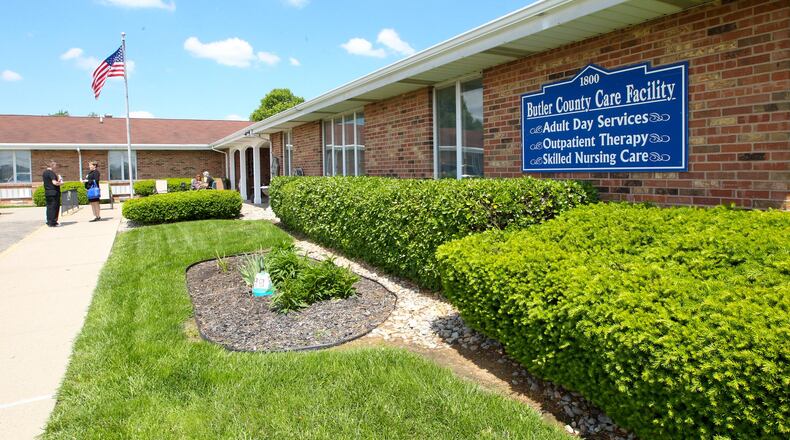Care Facility Administrator Evelyn McGee told the Journal-News there are a couple people on waiting lists for other facilities right now, but she is “anticipating maybe by the end of July, August everyone should be placed elsewhere.” She said word got out about the potential closing earlier this year and families sprang into action.
“We had that first wave of people leaving and they’ve been kind of leaving in waves,” McGee said. “And a lot of nursing homes they’ve been soliciting us because their census is low, they’ve been soliciting us for residents and our staff. It all depends on our residents and where they want to go, so yes it’s been a quick process.”
The union contract between the county and some of the workers was up this year and in an effort to keep as many staff on board as needed until it closes, the commissioners ratified a contract amendment with 14 union clinical and kitchen workers, bumping their hourly wages $5 and an additional $2 for the night shift.
“In an effort to retain clinical and dietary staff to address the skilled care and dietary needs of the residents as closure of the Care Facility is processing, the county identified it needed to incentivize current employees to remain,” County Administrator Judi Boyko said. “Especially in light of the available workforce and more specifically the extremely competitive clinical staffing environment presently.”
Staffing has been a real problem at the home throughout the pandemic, forcing the commissioners to use outside staffing agencies to help run the facility. The commissioners approved several short-term contracts with outside staffing companies have spent around $734,933 to-date. Since the outbreak of the pandemic and through the end of last year the county spent $1.3 million on outside agency workers.
According to the AARP Nursing Home COVID-19 Dashboard, as of the end of May, 39.3% of the nursing homes in Ohio were short-staffed; the average nationwide was 30.8%.
As part of the closure the commissioners decided to “sell” 75 of the Centers for Medicaid and Medicare Services skilled nursing bed certifications and put them out to bid a couple weeks ago. They hoped they might get as much as $750,000. Chris Hacker, the county’s asset, procurement and projects director told the Journal-News they did not receive any bids.
Commissioner Don Dixon was a little surprised.
“I’m a little surprised, but in today’s world with everything is upside down, I guess I shouldn’t be surprised,” Dixon said. “We’ll have to see what other path we can pursue with those.”
He said the beds — which have to be sold before the facility closes — will just revert back to the state if they can’t find any other takers, “nothing happens it’s just gone, done, we were trying to see if there was any value in the beds, but I guess not.”
Commissioner Cindy Carpenter said she kind of expected they wouldn’t be able to profit off the bed licenses.
“That’s what we’re seeing in the market right now, insurance companies are encourage people to stay at home longer, we have programs like our elderly services that pay for assistance, again encouraging people to stay at home,” Carpenter said. “So I guess we’re seeing the effect of that, that we in fact need less nursing home beds.”
The nursing homes were mandated in all 88 counties when the first facility was built in 1830 to serve the infirm, poor and homeless. Many of the facilities closed after the state legislature lifted the mandate and counties opted to let the private sector handle nursing care as government budgets shrank. The county built the Care Facility at 1800 Princeton Road in Hamilton in 1975.
Once the facility is empty the commissioners intend to use part of it for the new emergency mental health crisis stabilization center. Carpenter said the rapid exodus from the facility means “it puts the ball in our court to move forward with the crisis stabilization center so we’re going to have to move those plans forward, it’s another opportunity.”
Scott Rasmus, executive director of the Butler County Mental Health and Addiction Recovery Services Board, told the Journal-News recently it will cost an estimated $5 million to $6 million to run the crisis center. He said they are planning a 20-bed center where people would stay for three days to be stabilized, screened and referred to further service in the community.
Until he gets an architect’s opinion he won’t know the cost to retrofit the building for the new use. He hopes to issue a request for proposals for the program in September.
About the Author

